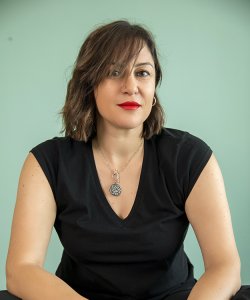Ten Questions for Zeina Hashem Beck

“I think it was essential that I turn further inward, that I trust the ‘quieter’ poems.” —Zeina Hashem Beck, author of O
Jump to navigation Skip to content

“I think it was essential that I turn further inward, that I trust the ‘quieter’ poems.” —Zeina Hashem Beck, author of O
Irish poet and novelist Martina Evans reads Wisława Szymborska’s poem “Could Have,” translated from the Polish by Stanislaw Baranczak and Clare Cavanagh, in this short film directed by Matthew Thompson and produced by the Adrian Brinkerhoff Poetry Foundation for their Words We Share series.

“Write because you want to, not to define yourself for the benefit of other people.” —Maya Marshall, author of All the Blood Involved in Love
“Today we’re going to get to work on the details / of your expression. And believe it or not, / the only colors we’re going to use will be / blacker than most blacks,” writes Terrance Hayes in his poem “Bob Ross Paints Your Portrait,” published in Paris Review’s Summer 2022 issue. In the poem, Hayes writes in the voice of American painter and television host Bob Ross, whose show The Joy of Painting aired on PBS in the 1980s and 1990s, as he delivers instructions on how to paint a portrait of the poet. This week, inspired by Hayes, write a poem in the form of a self-portrait. Try using instructional language to describe yourself, allowing any emotions that arise to make their way into the poem.
“For me, poetry is a way of living in the world.” In this vintage video from the Poetry Breaks series, Lucille Clifton reflects on what poetry means to her and how it is not about answers, but rather questions. The Academy of American Poets has partnered with Leita Luchetti, who produced and directed the series in the late 1980s and early 1990s, to bring back these videos.

The author of [WHITE] explores the benefits of writing to a specific audience and the risks of trying to meet the market’s imagined demands.
In this livestreamed event, poet and drag performer Wo Chan, author of Togetherness, forthcoming from Nightboat Books in September, and poet CAConrad, author most recently of AMANDA PARADISE: Resurrect Extinct Vibration (Wave Books, 2021), read from their works at the Poetry Project in New York City.
According to some astrological predictions, the “Cancer season” we entered this week is particularly auspicious thanks to a new moon influenced by Jupiter, the planet of good fortune. So why not try your luck by applying to some contests with a July 15 deadline? Among the awards are a $20,000 prize for a published story collection; a $15,000 prize for a poem; a $1,000 prize for a poetry collection; a $1,000 prize for a novel; and $1,000 prizes for individual poems, short stories, essays, and works of flash fiction. All contests offer a cash prize of $1,000 or more. May Jupiter’s benefic beams shine upon you, writers!
Cincinnati Review Robert and Adele Schiff Awards: Three prizes of $1,000 each and publication in Cincinnati Review are given annually for a poem, a short story, and an essay. Rebecca Lindenberg will judge in poetry, Michael Griffith will judge in fiction, and Kristen Iversen will judge in nonfiction. All entries are considered for publication. Entry fee: $20.
Comstock Review Muriel Craft Bailey Memorial Award: A prize of $1,000 and publication in Comstock Review is given annually for a single poem. Ellen Bass will judge. All entries are considered for publication. Entry fee: $27.50 (or $5 per poem via postal mail).
Ghost Story Screw Turn Flash Fiction Competition: A prize of $1,000 and publication on the Ghost Story website and in the 21st Century Ghost Stories anthology is given twice yearly for a work of flash fiction with a supernatural or magical realism theme. The editors will judge. Entry fee: $15.
Narrative Poetry Contest: A prize of $1,500 and publication in Narrative is given annually for a poem or group of poems. The poetry editors will judge. All entries will be considered for publication. All entries are considered for publication. Entry fee: $25.
Rattle Poetry Prize and Reader’s Choice Award: A prize of $15,000 and publication in Rattle is given annually for a single poem. A Reader’s Choice Award of $5,000 is also given to one of ten finalists. The editors will judge the Poetry Prize, and subscribers and entrants will judge the Reader’s Choice Award by vote. All entries are considered for publication. Entry fee: $25.
Regal House Publishing’s Petrichor Prize for Finely Crafted Fiction: A prize of $1,000 and publication by Regal House Publishing is given annually for a novel. The editors will judge. Entry fee: $25.
Story Prize: A prize of $20,000 is given annually for a short story collection written in English and published in the United States in the current year. Two runners-up receive $5,000 each. The $1,000 Story Prize Spotlight Award is also given for an additional short story collection “of exceptional merit.” Larry Dark and Julie Lindsey will judge the three finalists and the Spotlight Award winner; three independent judges will choose the Story Prize winner. Entry fee: $75.
Word Works Tenth Gate Prize: A prize of $1,000, publication by the Word Works, and 30 author copies is given annually for a poetry collection by a poet who has published at least two full-length books of poetry. Felicia Zamora will judge. Entry fee: $25.
Visit the contest websites for complete guidelines, and check out the Grants & Awards database and Submission Calendar for more contests in poetry, fiction, and creative nonfiction.
In this 2020 video, Tatiana Luboviski-Acosta reads a selection of their poems for the Quarantine Concert series produced by Experimental Sound Studio in Chicago. Luboviski-Acosta’s second book, La Movida (Nightboat Books, 2022), is featured in Page One in the July/August issue of Poets & Writers Magazine.
Today marks this year’s Summer Solstice, the longest day of the year and the date that officially signifies the beginning of summer in the Northern Hemisphere. It has been documented that the day was observed as early as the Stone Age, and cultures around the world continue to celebrate the occasion through feasts, festivals, and music. Write a poem inspired by the longest day and shortest night of the year. For further inspiration, peruse this list of poems on the Summer Solstice from the Academy of American Poets’ website.